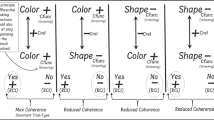Abstract
No one can access the original events to examine the veracity of a human experience in everyday situations. The present experiment was done to compare two conditions under which a participant remembered (1) her actual contact with the environment and (2) her indirect experience—information about another person’s direct experience that was communicated to her. Several differences in the forms of remembering such as narrative styles, way of describing and naming of object, motive for actions—were found to differ between those two conditions. Those differences were shown to disappear with repeated remembering occasions due to intrapersonal and interpersonal conventionalization. These results suggest that it is possible to examine the veracity of an experience based on forms of remembering, rather than on its content. Theoretical discussion links the present experiment to the study of memory and remembering from the perspective of Bartlett’s (Remembering: A study in experimental and social psychology. Cambridge: Cambridge University Press, 1932) schema theory.





Similar content being viewed by others
Notes
Transition of events in the parentheses
References
Bartlett, F. C. (1920). Psychology in relation to the popular story. Folk-Lore, 31, 264–293.
Bartlett, F. C. (1923). Psychology and primitive culture. New York: Macmillan.
Bartlett, F. C. (1932). Remembering: A study in experimental and social psychology. Cambridge: Cambridge University Press.
Bergson, H. (1889/1990). Jikan to jiyuu [Essai sur les données immé diates de la conscience]. Tokyo: Hakusui-Shya (translated into Japanese by H. Hirai).
Costall, A. (1991). Frederic Bartlett and the rise of prehistoric psychology. In A. Still, & A. Costall (Eds.), Against cognitivism (pp. 39–54). London: Harvester Wheatsheaf.
Edwards, D., & Middleton, D. (1987). Conversation and remembering: Bartlett revisited. Applied Cognitive Psychology, 1, 77–92.
Edwards, D., & Potter, J. (1992). Discursive psychology. London: Sage.
Gergen, K. J. (1994). Mind, text, and society: Self-memory in social context. In U. Neisser, & R. Fivush (Eds.), The remembering self: Construction and accuracy in the self-narrative (pp. 78–104). Cambridge: Cambridge University Press.
Gibson, J. J. (1979). The ecological approach to visual perception. Boston: Houghton Mifflin.
Hara, S., Takagi, K., & Matsushima, K. (1997). Psychological analysis on the communication style of the accused in trial (II)—A murder case at Ashikaga. Surugadai University Studies, 14, 109–176.
Loftus, E. (1997). Creating false memory. Scientific American, 277, 70–75 September.
Loftus, E., & Ketcham, K. (1992). The myth of repressed memory. New York: St. Martin’s Press.
Middleton, D., & Edwards, D. (1990). Collective remembering. London: Sage.
Middleton, D., & Brown, S. D. (2005). The social psychology of experience. London: Sage.
Mishima, H. (2000). The ecological mind. Tokyo: Nippon Housou Kyoukai Shuppan (in Japanese).
Mori, N. (1995). The function of remembering and the nature of a group in joint remembering. Japanese Psychological Review, 38, 107–136 (In Japanese with an English abstract).
Neisser, U. (1978). Memory: What are the important questions? In M. M. Gruneberg, P. E. Morris, & R. N. Sykes (Eds.), Practical aspects of memory (pp. 3–24). London: Academic.
Ohashi, Y., Mori, N., Takagi, K., & Matsushima, K. (2002). Psychologists meet trials. Kyoto: Kitaooji Shobo (In Japanese).
Shobe, K. K., & Schooler, J. W. (2001). Discovering fact and fiction: Case-based analyses of authentic and fabricated discovered memories of abuse. In G. M. Davis, & T. Dalgleish (Eds.), Recovered memories: Seeking the middle ground (pp. 95–151). Chichester: Wiley.
Shotter, J. (1990). The social construction of remembering and forgetting. In D. Middleton, & D. Edwards (Eds.), Collective remembering (pp. 120–138). London: Sage.
Wooffitt, R. (1992). Telling tales of the unexpected: The organisation of factual discourse. London: Harvester Wheatsheaf.
Acknowledgement
The author is indebted to Professor Nobusuke Shimizu of Hokusei Gakuen University and Professor Makiko Naka of Hokkaido University for their support to the present experiment. He is also grateful to Professor Kentaro Suzuki of Sapporo Gakuin University for his helpful suggestion to the data analysis and Professor David Dalsky of Kyoto University for his consultation of English writing.
The present study was done with the support of the 2003 Sapporo Gakuin University Research Support Grant.
Author information
Authors and Affiliations
Corresponding author
Rights and permissions
About this article
Cite this article
Mori, N. Styles of Remembering and Types of Experience: An Experimental Investigation of Reconstructive Memory. Integr. psych. behav. 42, 291–314 (2008). https://doi.org/10.1007/s12124-008-9068-5
Received:
Accepted:
Published:
Issue Date:
DOI: https://doi.org/10.1007/s12124-008-9068-5




